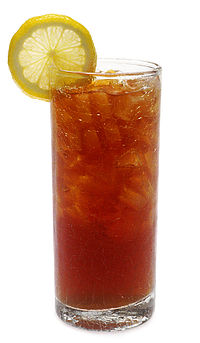Since arriving in Los Angeles, I have found a new appreciation for iced tea. Iced tea inherently lacks the aromatic complexity of hot tea, but when it's over 90 degrees outside, cold beverages have certain advantages.
Fortunately, iced tea is nowhere near as challenging to make as iced coffee. One of the main reasons that my interest in coffee has waxed and my interest in tea has waned is that tea is really quite simple to make. Tea need not—should not—be ground before brewing, as coffee must. Eliminating the grinding step greatly simplifies matters, given how crucial controlling the coarseness of the grind is to brewing coffee.
The second reason that tea is easy to make is that tea seems to be relatively insensitive to extraction (see previous post for info on coffee extraction). Strength is still important, since overly strong tea is unpleasantly tannic, and weak tea is, well, weak. But brewing tea to the same strength with a longer steep time and less tea vs. using more tea and a shorter steep time yields fairly similar results (up to a point). If you tried the same thing with coffee you'd see dramatic differences, due to the differing percentages of the coffee solids that would be extracted. Tea's insensitivity to under- and over-extraction also explains why one can steep tea leaves multiple times, whereas brewing with used coffee grounds... not so tasty.
Since under-extraction is not a big concern, brewing hot tea at double strength and pouring it over ice immediately after steeping yields good results. Brewing tea (regular strength) at room temperature for 8–16 hours also works, provided you protect the tea from oxygen; mason jars work well for this purpose. Hot-brewed and cold-brewed iced teas have different flavor profiles, but they're both agreeable to my palate. I've found cold-brewed tea to be a bit clearer in appearance, but your mileage may vary. One advantage of hot-brewed iced tea is that it can be a more efficient use of tea, if you incorporate a second steep using a longer steep time and adding less ice.
More important than brewing method is the kind of tea used. Some teas make really terrible iced tea. My current favorite iced tea is a blend of two parts Ceylon to one part Keemun. The brisk citrus flavor of Ceylon makes a fantastic base, and the intense floral/incense notes of the Keemun add sweetness and complexity.
Finally, there's the question of sugar and lemon. I prefer unsweetened tea, but sweetened iced tea has a long tradition. I've always been tempted to sweeten tea with honey, since it tastes nice and is (maybe) healthier than sugar. After a few experiments, though, I can't recommend it, unless you really like the taste of honey. The problem is that honey has such a strong flavor that it tends to overpower the flavors of the tea itself. So stick with plain old refined white sugar or nothing at all, unless you're making chai.
I sometimes like lemon in iced tea, because the acidity adds a refreshing brightness and complements the citrus flavors of Ceylon tea. But lemon can easily overpower the tea's flavor, so I usually add only a very small amount—maybe 1/16th of the juice of a lemon. I recently had an unusual idea that I think is worth trying, which is to bypass the lemon and add acid directly to the tea. Homebrew shops sell acid blends for winemakers to use to add acidity to their wines. These blends contain several naturally occurring acids, namely malic, citric, and tartaric acids. Malic acid is found in high concentrations in apples, and citric acid is highly concentrated in (surprise!) citrus fruits. Tartaric acid is a bit less familiar, but wine grapes contain a balance of all three acids. My goal in using an acid blend would be to add acidity to the iced tea without the strong aromatic flavors that lemon also contributes.


Hot days and cool, crisp iced tea seem like a match made in heaven. And plenty of people agree.
ReplyDeletehttps://icemakershub.com/best-sonic-pebble-nugget-ice-machine-reviews/
According to the Tea Association of the USA, about 75 to 80 percent of the tea consumed in the U.S. is iced tea. And Americans guzzled more than 1.8 billion gallons of ready-to-drink iced tea in 2018, making it one of the most widely sold drinks.
Awesome ! Great Article for Green tea really i am Empress Thanks for sharing
ReplyDeleteBenefits of Tea